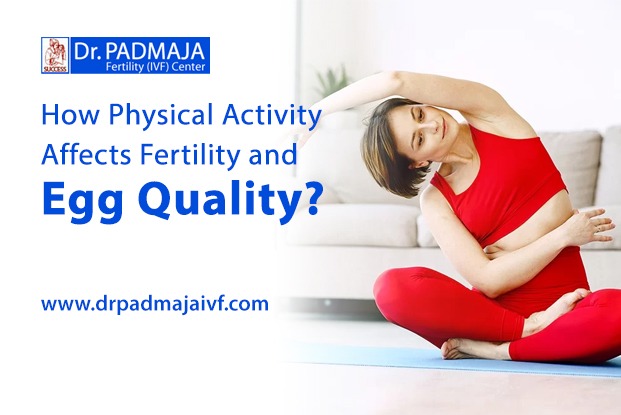Physical activity plays a vital role in overall health and can significantly influence fertility and egg quality. Maintaining an active lifestyle may support reproductive health, but finding the right balance is key. Over-exercise can sometimes negatively impact fertility, while moderate, well-managed activity can enhance reproductive outcomes. For those considering fertility treatments, such as at Dr. Padmaja IVF in Hyderabad, understanding the connection between exercise and fertility can be beneficial.
The Positive Effects of Physical Activity on Fertility
- Improved Blood Circulation: Regular physical activity promotes better blood flow throughout the body, including to the reproductive organs. Enhanced blood circulation is essential for delivering nutrients and oxygen to the ovaries, supporting egg quality. Patients undergoing procedures at fertility centers in Hyderabad, like Dr. Padmaja IVF, may see positive effects with moderate exercise incorporated into their routine.
- Hormonal Balance: Exercise helps regulate hormones, including those that are crucial for fertility, such as estrogen and progesterone. Balanced hormones play a significant role in ovulation and menstrual regularity, both of which are important for conception. Women experiencing irregular cycles or ovulation issues may find moderate activity helpful in achieving hormonal stability, especially if they’re considering advanced fertility treatments, such as IVF or ICSI, available at top IVF centers in Hyderabad.
- Stress Reduction: Stress can negatively impact fertility by disrupting hormone levels and ovulation. Physical activity is known to alleviate stress by releasing endorphins, improving mood, and lowering anxiety levels. For patients dealing with infertility in Hyderabad, particularly those undergoing high-stakes treatments like egg donation or test tube baby procedures, managing stress through gentle exercises like yoga or walking can be very beneficial.
The Risks of Excessive Exercise on Egg Quality
While moderate activity has its benefits, excessive or high-intensity exercise can have the opposite effect on fertility and egg quality. Over-exercise may lead to hormonal imbalances, such as reduced estrogen levels, which can affect ovulation and decrease the chances of successful conception.
- Ovulatory Dysfunction: Excessive exercise can disrupt menstrual cycles and even halt ovulation altogether, making conception challenging. Patients at IVF hospitals in Hyderabad, India, are often advised to keep their physical activity balanced to avoid ovulation-related issues.
- Impact on Egg Quality: High levels of physical stress can lead to a condition known as “oxidative stress,” which may impact the quality of eggs. This can be a particular concern for women undergoing procedures like acolyte donation or ICSI, where egg quality is paramount.
Finding the Right Balance for Fertility
For those pursuing fertility treatments at Dr. Padmaja IVF or other fertility centers in Hyderabad, maintaining moderate exercise is usually recommended. Activities like brisk walking, swimming, and gentle yoga can support overall well-being without putting undue stress on the body. Always consult with a fertility specialist to tailor an exercise plan that complements your fertility goals.
How Physical Activity Supports Fertility Treatments
For individuals undergoing treatments such as IVF or IUI at Hyderabad’s top fertility clinics, moderate physical activity can support better treatment outcomes. Physical activity improves circulation and stress management, both beneficial for those facing the emotional and physical demands of fertility treatments, including test tube baby and acolyte donation.
Conclusion
Physical activity is a valuable component of fertility health, especially when balanced appropriately. For those considering treatments at Dr. Padmaja IVF or other leading IVF centers in Hyderabad, incorporating moderate exercise can support both fertility and overall well-being. Always discuss exercise plans with your healthcare provider to ensure the best outcomes for your fertility journey.
Frequently Asked Questions (faqs)
1. Does exercise improve fertility in women?
Yes, regular, moderate exercise can improve fertility by promoting hormonal balance, reducing stress, and enhancing blood circulation to reproductive organs. However, excessive or high-intensity workouts can have the opposite effect, potentially disrupting menstrual cycles and hormonal levels, which may negatively impact fertility.
2. How does physical activity affect egg quality?
Physical activity can positively affect egg quality by reducing oxidative stress and enhancing blood flow to the ovaries. Moderate exercise has been shown to improve metabolic health, which may create a better environment for eggs to mature and develop. However, excessive exercise can negatively impact egg quality due to increased stress and cortisol levels.
3. Can being overweight or underweight affect fertility?
Yes, both being overweight and underweight can affect fertility. Excess body fat can lead to hormonal imbalances that may disrupt ovulation, while being underweight or having too little body fat can reduce estrogen levels and interfere with menstrual cycles, making it harder to conceive.
4. How much exercise is recommended for women trying to conceive?
For women trying to conceive, moderate exercise such as walking, swimming, or light jogging for 30 minutes a day, five days a week, is often recommended. This amount of physical activity helps maintain a healthy weight and reduces stress without overburdening the body.
5. Can high-intensity workouts affect ovulation and menstrual cycles?
Yes, high-intensity workouts, especially when done excessively, can impact ovulation and menstrual cycles. Intense exercise can lead to a drop in body fat and increase cortisol levels, which can interfere with the production of reproductive hormones and result in irregular or missed periods.
6. Is yoga beneficial for fertility and egg quality?
Yoga can be very beneficial for fertility and egg quality. Certain yoga poses increase blood flow to the reproductive organs, reduce stress, and improve flexibility, which can contribute to a healthier reproductive system. Additionally, yoga promotes relaxation and reduces anxiety, both of which can positively affect fertility.
About The Author :

If Dr. Padmaja Divakar is a public figure or a professional in a specific field, I recommend checking her official website, professional profiles, or reliable online sources for the most up-to-date and accurate information about her background, qualifications, and achievements.

